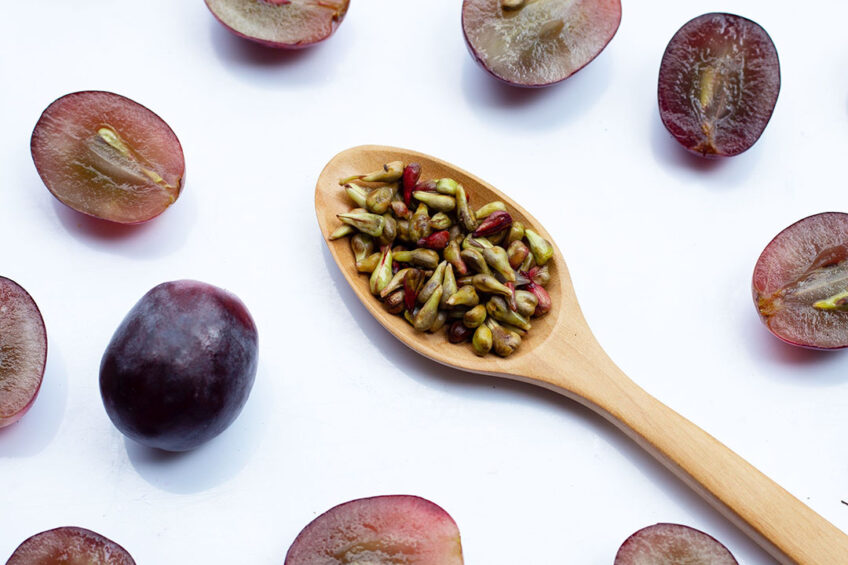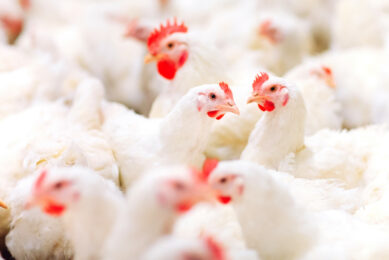Grape seed extract in poultry diets yield health benefits

Grape seeds are by-products of processed grape products such as grape juice, grape molasses, and wine production. The seeds are milled and processed into an extract that can be used in poultry diets to perform a variety of biological functions in both broilers and layers.
Seeds are collected from the grape processing plants, dried in the shade for 3-4 days, ground to a fine powder in a hammer mill and then extracted with a 100% ethanol medium at a rate of 100g milled seeds per 500ml of ethanol for 48 hours at room temperature. Supernatants are separated from the suspension by filter and the ethanol medium is removed by using a rotary evaporator under vacuum at 50-60°C. The obtained grape seed extract (GSE) is maintained at 4°C in the refrigerator and can be used in poultry diets at 0.5-1% for broilers and up to 3-4% for layers to perform a variety of biological functions.
Effects on immune status
Studies have shown that grape seed extract (GSE) used in poultry diets at the above-mentioned rates has powerful antimicrobial properties due to an abundance of phenolic compounds. These compounds are capable of killing a wide variety of protozoa, bacteria, yeast and some viruses, while also treating parasitic infections.
GSE has also played a significant role in enhancing immunity through histological and functional changes in various body tissues and immune organs. At the tissue level, feeding GSE increases the number of macrophages, a type of white blood cell that surrounds and kills micro-organisms, removes dead cells and stimulates the action of other immune system cells. GSE also improves the function of the thymus gland and enables it to act, through its polypeptide hormone thymosin, on stimulating the development of precursor T cells in the thymus to mature T cells that protect the body against infections. Further, GSE increases the number of follicles in the spleen and the development of its sheath, which enables this organ to filter the blood and make antibodies that help fight infection.
GSE may thus be successfully used as an alternative to antibiotics and hence alleviate many problems associated with the latter, such as an abnormal appearance on the liver and minor atrophic changes in the kidney and intestine, in addition to the development of antibiotic-resistant bacteria over time.
Effects on GI tract and nutrient utilisation
Supplementation of GSE helps improve feed efficiency and nutrient digestibility by increasing the absorptive surface in the intestine of chickens. It also serves as a potential prebiotic agent leading to improvements in gut health and in the integrity and inhibition of colonisation by pathogens such as C. perfringens which cause necrotic enteritis and reduce digestion, absorption and feed efficiency. In addition, GSE helps prevent ulcerative enteritis that is caused by infection with C. colinum and has led to haemorrhagic enteritis and sudden death in severe cases.
The changes in the intestinal structure and environment associated with the use of GSE in the diet inevitably lead to improved utilisation of essential feed nutrients. There is, for example, improved utilisation of the dietary protein which regulates GI secretions and endogenous losses and partly compensates for a deficiency of vitamin B12 by providing essential methyl groups through its amino acid methionine. There is also improved utilisation of dietary fat with supplementation of GSE, which entails better utilisation of fat-soluble vitamins A, D, E and K.
GSE as an antioxidant
Supplementation of broiler chicken diets with GSE resulted in a significant increase in the hepatic level of glutathione (an antioxidant capable of preventing damage to important cellular components caused by free radicals, peroxides, lipid peroxides and heavy metals), which is considered to be an indicator of the antioxidant status of birds. GSE also causes an increment in circulating phenolic metabolites, which further improves the antioxidant status of birds. The antioxidant potential of grape seed polyphenols has been reported to be 20 and 50 times greater than vitamins E and C, respectively.
For chickens fed on a diet supplemented by GSE there was also a significant decrease in the level of malondialdehyde (one of the final products of polyunsaturated fatty acids peroxidation in the cells), which is considered to be an indicator of oxidative stress. The decreased malondialdehyde level helps certain enzymes function and delays lipid peroxidation of thigh meat, thus improving meat quality.
Growth performance
In one study, broiler LBW was significantly improved when fed a diet containing GSE from day 1 through day 35 of age (Table 1). These improvements may be due to increased villus height, absorptive surface area, enzyme expression and transport systems of nutrients, which resulted in improved body weight gain. Due to the natural antioxidants in GSE, which protect the intestinal mucosa from oxidative damage and reduce intestinal movement, there was better absorption of nutrients.
Effects on egg production
It was found that the addition of GSE in laying hens’ diet increased egg production by 4% due to an increase in laying rate. There were also increased egg weights from 66.6g to 68.7g as a result of GSE supplementation. This was attributed to the probiotic nature of GSE, which aids ovarian development, increases digestive enzyme activity and regulates the pH of the gastrointestinal tract, thus increasing intestinal calcium and magnesium absorption and improving utilisation of protein and other nutrients that are essential for egg production.
In terms of quality, shell strength was increased from 2.79 to 3.02 kg/cm2 and the percentage of damaged eggs was thus reduced from 3.3% to only 0.42% as a result of GSE supplementation. Haugh units (a measure of egg protein quality based on the height of the egg white or albumen) were also increased from 81.1 to 85.2 in birds fed GSE in their diet. Cholesterol levels in GSE groups were reduced compared to hens fed the control diet and the malondialdehyde in yolk was altered linearly by the addition of GSE to the basal diet, thus improving the antioxidant status in laying hens.
Uses of GSE under heat stress conditions
GSE is an excellent source of vitamin E. Each kilogramme of GSE may contain up to 500 mg of vitamin E. This is important for birds exposed to heat stress whereby birds exhibit a decrease in thyroid hormones, atrophy of lymphoid organs, impaired health and survival, increased incidence of PSE meat (pale, soft, and exudative) and oxidation of meat after slaughter. In this case, vitamin E can be a useful tool for improving poultry performance under heat stress due to its positive effects on the immune system, muscle integrity and endocrine growth factors sensitive to heat, besides its positive effects on the activity of antioxidant enzymes and haematological parameters (e.g., reduced uric acid, reduced cholesterol, increased lymphocytes, etc.).
Points to consider
The effects of GSE on various production traits are dose-dependent. Increasing the supply of GSE above the recommended level (0.5-1% for broilers and 3-4% for layers) may reduce feed intake due to the presence of appreciable amounts of tannin, which has a bitter taste and hence reduces palatability and the digestibility of feed nutrients through H-bonds and hydrophobic interactions, thus adversely affecting most biological functions of birds.
On the other hand, GSE supplementation at a proper dosage has positive effects on a bird’s health and performance, as indicated above, and may also improve the profitability of the poultry-rearing industry by increasing the production index under normal farm conditions.











